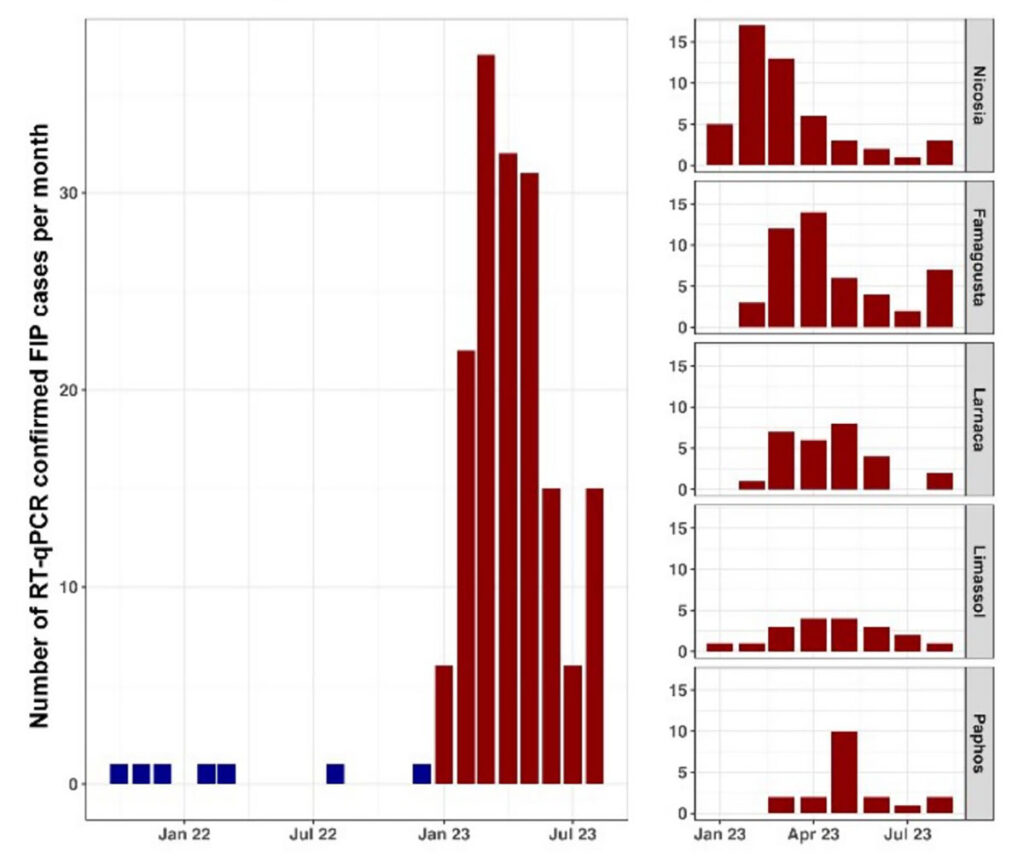Feline coronaviruses (FCoV) are distributed worldwide and commonly seen in veterinary practice. There are two different biotypes:
Feline enteric coronaviruses (FECV) infect the enterocytes of the intestine. They are seen as low pathogenic and can cause mild enteritis. These viruses are transmitted via the faecal-oral route. Re-infections are common.
Feline infectious peritonitis viruses (FIPV) originate in mutations in individual host cats, which had been infected with FECV. A change in biotype is accompanied with a change in tropism for host cells: the viruses are now able to penetrate macrophages and can therefore invade different tissue types. This presents with a very different clinical picture, namely the feline infectious peritonitis (FIP). FIP is a life-threatening disease of individual cats, which presents with distinct clinical symptoms. These include, among others, fever, lethargy, anorexia, weight loss, swollen abdomen, icterus, dyspnea, neurological symptoms and uveitis. Usually, the potential for transmission of FIPV is negligible.
At least until now.
During 2023, there was a massive increase in FIP-cases on the island of Cyprus.
During the first seven months of that year, the number of cases confirmed by PCR increased 40-fold, compared to the previous year (Fig. 1). The actual number of affected cats is unknown, since there are many stray cats on Cyprus. The „Pancyprian Veterinary Association“ estimates the number of deceased cats until July 2023 at around 8000. A FIP outbreak of this magnitude has not been observed previously.
-
Stray cats
Source: envatoelements
-
Fig. 1: Number of PCR-confirmed FIP cases in Cyprus and in the provinces Nicosia, Famagousta, Larnaca, Limassol and Paphos.
Source: Attipa et al., 2023
Subsequent sequencing of the viral genome confirmed, that a majority of these cats were infected by a new virus variant. This new, highly pathogenic coronavirus, proposed to be named “FCoV-23”, originates from a recombination of feline and pantropic canine coronaviruses. The detected, highly homologous virus sequences, from different regions on Cyprus and different points in time during the outbreak, indicate a direct transmission. A change of biotype in individual animals does not appear to be necessary. Analyses of the sequences, especially of the surface spike protein, show changes in the ability to bind to receptors and a resulting change in cell tropism.
The clinical picture corresponds to a „classical FIP“. However, there was an increased number of cases with neurological symptoms. Cats of all ages were affected, including indoor-only cats without contact to others.
In October 2023, a first case of FCoV-23 was confirmed in the UK. The cat developed FIP shortly after the import from Cyprus. Due to consequent quarantine measures, no further infections connected to this case are known.
It was therefore of upmost importance to ascertain if FCoV-23 can also be detected in other European countries. To determine this, a study undertaken by LABOKLIN examined around 700 samples that had been confirmed positive for coronavirus by PCR. These samples (aspirate of abdomen/thorax, cerebrospinal fluid, EDTA whole blood) were submitted between January 2023 and February 2024 for routine diagnostics. Among these were also 120 samples from Cyprus.
In around 80 % of the samples from Cyprus, as well as in two samples from Bulgaria, FCoV-23 could be detected. The two samples from Bulgaria were submitted in April and June 2023, quite early in the course of the outbreak in Cyprus. Additional suspicious cases from Romania and Greece are being examined, but show genetic differences.
What is the impact on the practicing veterinarian?
- With each suspected case of FIP, time abroad (import, travel, and others) has to be determined
- Cats with a suspected FIP and with a history of travel abroad, especially travel to South-Eastern Europe, should be quarantined
- A specific PCR for the detection of FCoV-23 is available, following FIP diagnostic This is of particular relevance in cats from abroad or if there is an increased incidence of FIP cases.
Dr Michaela Gentil
Service portfolio concerning FIP and FCoV-23
- Coronavirus-PCR (qualitative and quantitative)
- FCoV-23-PCR
- Serum-protein-electrophoresis
- Thorax/Abdomen (Examination of aspirates including cytology)
- Rivalta-test





